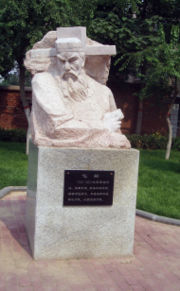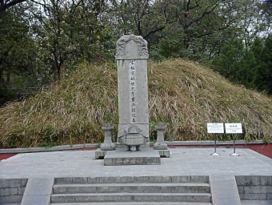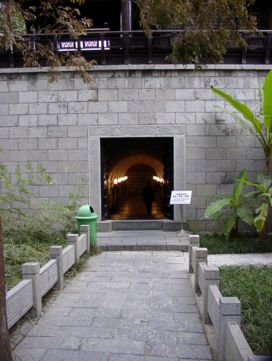| 貍貓換太子 [ 太子為仁宗] 宋朝真宗時,西宮劉妃及奸臣郭槐以貍貓換李辰妃的初生兒子,李辰妃被打落冷宮。幸 得宮女寇珠和太監陳琳救出嬰孩,冒死將之送予皇帝之兄八賢王撫養。劉妃及郭槐欲放火燒冷宮,寇珠救出李辰妃,被二人嚴刑迫問,陳公公更在二人強迫下,將寇珠打死棍下。李辰妃流落民間,與養子郭海壽相依為命。帝駕崩後,無子嗣,兄八賢王之子得皇帝傳位,是為仁宗,由劉妃攝政。李辰妃後得包公相助,回宮與兒子相認。仁宗不肯相認親母,包告上玉皇大帝,雷公震怒,電劈龍座,仁宗終相認親母。郭槐不肯招認罪行, 包公使計令郭槐供出一切,最後奸臣被問斬,劉妃為罪自縊。 |
 |
|||
| Bao Zheng (Chinese: 包拯; pinyin: Bāo Zhěng) (999–1062) was a much-praised judge from Song China. His job title was the Mayor of the capital city Kaifeng (開封府尹) at the time. Because of his renowned fairness, he was popularly glorfied "Blue-Sky Bao" (Chinese: 包青天; pinyin: Bao Qingtian) or "Lord Bao" (Chinese: 包公; pinyin: Bao Gong). He was also nicknamed "Darkie Bao" (Chinese: 包黑子; pinyin: Bao Heizi) by his enemies due to his very dark complexion. (This is more of a myth and glorification.) His courtesy name was Xiren (希仁). He was born into a scholar family in Hefei, Anhui province, where the Memorial Temple of Lord Bao (包公祠) is still located near the city centre. It was built in 1066 close to his tomb. At the age of 29, he passed the highest-level imperial exams and became qualified as a Jinshi. He was a magistrate in Bian (Kaifeng), the capital of the Song dynasty. He is famous for his uncompromising stance against corruption among the government officials at the time. He upheld justice and refused to yield to higher powers including the "royal father-in-law" (國丈) who was also appointed as the Grand Tutor (太師) and was known as Grand Tutor Pang (Chinese: 龐太師; pinyin: Pang taishi) he treated Bao as an enemy. He had conflicts with other powerful members of the imperial court as well, including the Prime Minister, Song Yang. He had 30 high officials demoted or dismissed for corruption, bribery, or dereliction of duty. He also had Zhang Yaozhuo, uncle of the high-ranked imperial concubine impeached 6 times. In addition, as the imperial censor, he avoided punishment despite having many other contemporary imperial censors punished for minor statements. Bao Zheng also managed to remain in favor by cultivating a long standing friendship with one of Emperor Renzong's uncles, the Eighth Imperial Prince (Chinese: 八王爺; pinyin: Ba Wang Ye). His burial site in Hefei contains his tomb along with the tombs of family members and a memorial temple. In opera or drama, he is often portrayed with a black face and a white crescent shaped birthmark on his forehead. In most dramatization of his stories, he used a set of guillotines, given to him by the emperor, to execute criminals. The one decorated with a dog's head was used on commoners. The one decorated with a tiger's head was used on government officials. The one decorated with a dragon's head was used on royalties. He was granted a golden rod by the previous emperor which he was authorized to chastise the current emperor with. He was also granted a precious sword from the previous emperor as a license to execute any royalties before reporting to the emperor to get approval first (from where arose the idiom "先斬後奏", kill first, report later). In these works he was often helped by 12 deputies and detectives, collectively known as 七俠五義 (seven Xia and five Yi). His name became synonymous with justice, with the clear blue sky (qing tian; 青天) became a popular metaphor to justice in the Chinese-speaking world. Due to his strong sense of justice, he is very popular in China, especially among the peasants and the poor. He became the subject of literature and modern Chinese TV series in which his adventures and cases are featured. There are many legends and stories about Bao and his witty approach to solve mysterious and tough cases. Some famous examples include: 《鍘美案》 The story about Bao executing Chen Shimei (陳世美), who abandoned his previous wife (and later tried to have her killed) in order to marry royalty. 《貍貓換太子》 The story of a plot to discredit a concubine by swapping her son (the new born crown prince) with a civet, in which Bao disguised as Yan Luo to try Guo Huai (郭槐). Guo supported Bao in front of the Emperor early in his career, making the case personally difficult for the judge. The perpetrator confessed when he thought he was in hell. |
 |
|||
 |
||||